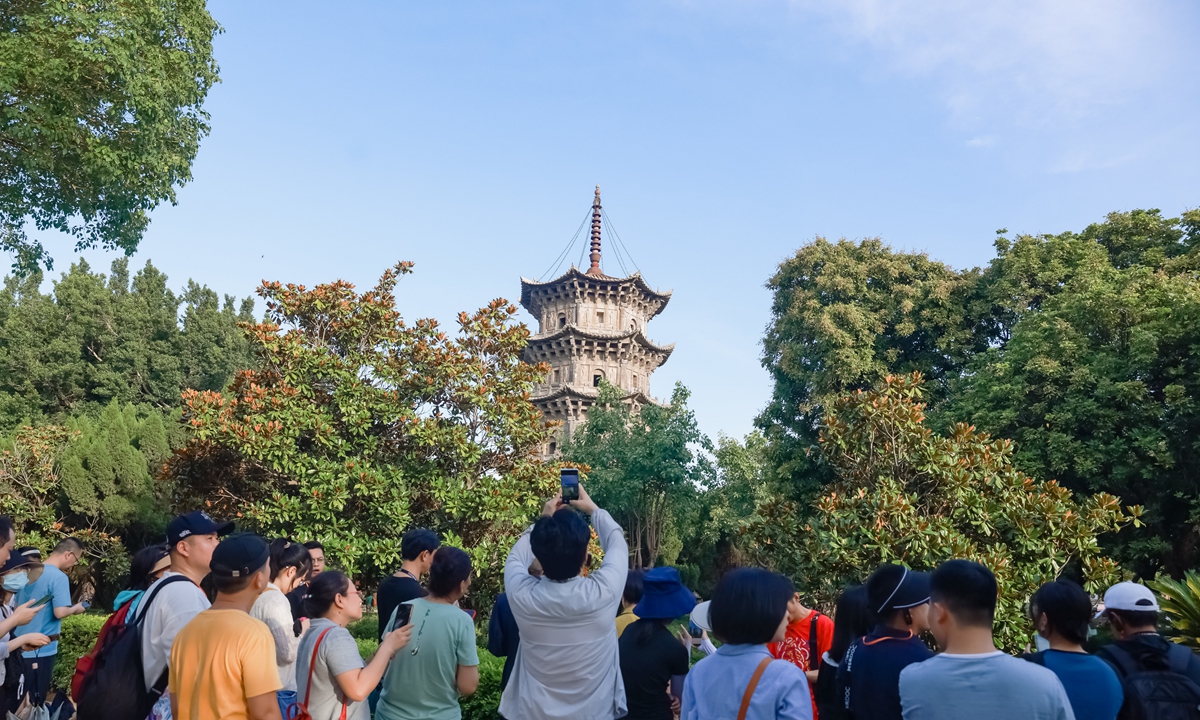ARTS / CULTURE & LEISURE
International filmmakers call for honest image of China
Intl filmmakers call for honest image of China

People at the Maritime Silk Road International Documentary Film Festival look at the ancient pagoda at Kaiyuan Temple in Quanzhou, the biggest ancient Buddhist temple in East China's Fujian Province. Photo: Courtesy of organizers
The 2023 Maritime Silk Road International Documentary Film Festival came to an end in Quanzhou, East China's Fujian Province on Thursday, with over 400 industry insiders from both home and abroad sharing their ideas on how to build a better international platform for documentaries.
Guests attending the event told the Global Times that China is a "treasure" for documentaries, which can convey "an honest and fair" image of China to the world.
Miao Tong, producer of the documentary series A Long Cherished Dream, told the Global Times that despite the "toxic" rhetoric about China from many Western politicians and media outlets, there is still a significant audience with open and curious attitudes and it is important to show them the real lives and thoughts of Chinese people.
"People in the West. They are getting lied to by their own media, by journalists, by intellectuals and by the politicians," Malcolm Clarke, Academy Award-winning filmmaker and the director of the documentary series A Long Cherished Dream, told the Global Times, adding that "all I want to do is to try and tell a story which is honest, which is fair."
Clarke recalled when he returned to China in 2013 for a documentary on former US secretary of state Henry Kissinger, he was shocked by what he witnessed and the fast development in the country compared to what he saw when he first came in the 1980s.
"I'd like to say to my Western friends, if you really want to see the future, come to China," he said at the film festival.
Over the eight years of working with Clarke, Miao said he has learned professionalism and persistence from the British director. He pointed out that there are international filmmakers and producers, like Clarke, who are dedicated to bridging the "information gap" between China and the West. They have visited China and witnessed its true nature, and they believe that escalating conflict and confrontations is dangerous and meaningless, and that China should be objectively understood and treated on the international stage.
"Having such international colleagues supporting the international dissemination of Chinese stories and providing constructive criticism and advice is truly inspiring," he said.
As producer and director of A Long Cherished Dream, the two experts said the feedback they received from international audiences shows that they were moved by the credible depictions of Chinese people.
"Through A Long Cherished Dream, audiences can see their own reflections in the struggles and sacrifices of these individuals, finding points of resonance," said Miao.
The four-episode series records the great changes the country has witnessed over the years toward a moderately prosperous society from the perspective of ordinary people. Every person in the film, including a village Party secretary, truck driver, acrobat and private entrepreneur, were once poor, but they changed their lives through hard work and China's rapid economic take-off.
Mathieu Béjot, director of strategy and development of international documentary marketplace Sunny Side of the Doc, told the Global Times that the world certainly needs more stories about China, in order to account for its richness, its diversity, its mix of heritage, tradition and extreme innovation, to mention only a few characteristics.
"The most important thing is to tell strong, compelling stories which can resonate internationally rather than focus on telling stories about China. If your stories and your characters can touch viewers throughout the world, they will naturally shine a light on China," he said.
Having had a long history of collaboration with China, Béjot said besides traditional feature documentaries and broadcast formats, streaming platforms are contributing to new forms of storytelling and new formats.
Wang Yuxiao, one video creator on video platform Bilibili, was invited to participate in the event forum and share his perspective. Internet-savvy creators like him play an important role in the development of Chinese documentaries. They excel at uncovering stories that attract audiences' attention to non-fiction works, while also providing valuable material and inspiration to feature-length documentary filmmakers.
But Miao noted that the international dissemination of Chinese documentaries still faces challenges. On one hand, the hostile Western media environment poses obstacles to the global distribution of Chinese content. On the other hand, China lacks outstanding works that adopt narrative styles accepted by Western audiences. The common goal among the forum, foreign documentary colleagues, and domestic documentary peers is to promote the international outreach of Chinese documentaries.
"It is up to us to tell the world what we see in China, but it is also up to China to do a better job of telling its own stories, because there are 1.4 billion fantastic stories in this country, and the world deserves to hear them," said Clarke.

